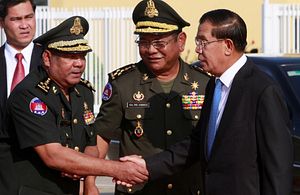Cambodians head to the polls this Sunday, with Prime Minister Hun Sen all but guaranteed of winning the election after he accused the main opposition party of fomenting a “color revolution,” triggering their dissolution by the courts amid a broader crackdown on dissent.
Twenty parties will contest this ballot but without the Cambodian National Rescue Party (CNRP) and its leader Kem Sokha – currently in prison on charges of treason – it will be a decidedly one-sided affair for Hun Sen, the region’s longest serving leader.
Human rights groups argue that 16 of the minor parties are simply proxies of the ruling Cambodian People’s Party (CPP), the exceptions being the Khmer Will Party, the League for Democracy Party, and the Grassroots Democracy Party.
None of the minor parties won any seats in the 123-seat National Assembly at the 2013 poll. This time around they are expected to benefit from the ban on the CNRP but are unlikely to pick up more than a handful of seats.
However, as with all Cambodian elections, the story that unfolds in the aftermath is often more telling than the events leading up to the ballot.
The 2003 election resulted in no government for a year, with Hun Sen struggling to form a coalition with the royalist Funcinpec, which was then a party to be reckoned with.
Five years later, the illegal Thai invasion and occupation of the Cambodian temples on the border at Preah Vihear dominated the headlines before and after, underpinning a landslide victory for the CPP.
In 2013, the CNRP shocked the CPP by capturing a burgeoning youth vote and making inroads into Hun Sen’s rural heartland, where land grabbing, an ever-widening wealth gap, and corruption had left its mark.
Kem Sokha and then-CNRP leader Sam Rainsy refused to accept the results amid allegations of electoral fraud, and deadly protests ensued. Then there was the emergence of the current crackdown on the CNRP, its supporters, and the press, where dissenters have been jailed, fled, or silenced.
Like previous elections, the final weeks of campaigning for this poll has been peaceful. Turnout rates, success of the minor parties, and the popular vote will still matter but, again, what happens after the election should prove far more revealing.
The EU has warned Cambodia now risks being removed from the Everything But Arms (EBA) agreement, designed to help least developed countries export duty-free goods into the European market, because “in the trade policy of the EU, social justice is a vital aspect.”
Australian authorities are widely expected to review assets owned by Cambodians, particularly the leadership, after an Al Jazeera report cast doubts over Australian investment interests controlled by Kong Vibol, head of Cambodia’s tax department.
The United States has already started to impose sanctions on Cambodia, including visa restrictions for its refusal to accept any more deportations of Cambodian citizens living in the United States with criminal convictions.
It has also singled out General Hing Bun Heang, commander of Hun Sen’s bodyguard unit, over human rights abuses. His U.S. assets were frozen, while U.S. entities, including banks, are banned from doing business with him. This relates to a deadly 1997 grenade attack on Sam Rainsy supporters as well as other more recent incidents. A list of other potential candidates is also being drawn up in Washington.
The sanctions wrecking ball is gaining momentum, with Congress introducing the Cambodian Democracy Act of 2018 back in May which would move toward imposing travel bans and financial sanctions on the CPP leadership for “undermining democracy.”
Low-paid garment workers are most at risk, as is big business responsible for production, shipping, and ports, should the United States deny access to a generous quota scheme for Cambodian-made products.
Hun Sen and his phalanx of businessman, who are also in politics, are hoping a big-spending China will step in and pick up any shortfall. That’s probable given the strategic and economic weight Beijing places on Cambodia in terms of its broader regional ambitions.
However, this will only lead to increased isolation for Cambodians, a dreadful prospect for those who remember the dark days of the Cold War. Expect diplomatic brinkmanship to be played out over the months and years to come, long after the election is done.
Luke Hunt can be followed on Twitter @lukeanthonyhunt
































